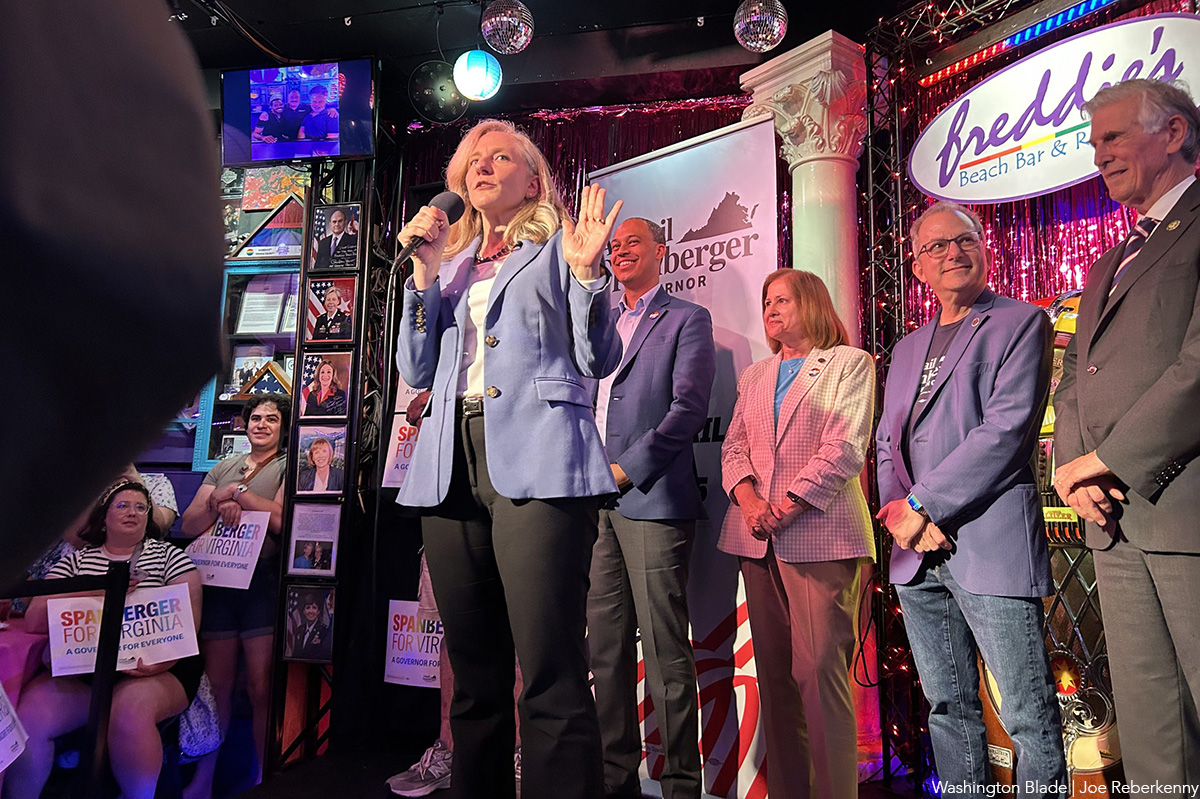Local
Uncertainty remains after Md. marriage opinion
Even the experts are uncertain how Maryland courts will now treat legally married same-sex couples.
Gov. Martin O’Malley (D) promised state agencies would comply with Attorney General Doug Gansler’s finding two weeks ago that Maryland may legally recognize out-of-state same-sex marriages.
But circuit courts that handle family violence protection orders and divorce cases are not bound by O’Malley’s directive and must consider the opinion on its own merits, according to several legal experts who spoke with DC Agenda.
“It’s certainly their prerogative whether to follow that. I would like to think the courts would accept the opinion, but we don’t know,” said Barbara Babb, director of the University of Baltimore’s Center for Families, Children and the Courts.
“Legislative direction would certainly be a help to the courts, but I don’t think it’s necessary for them to do the right thing.”
Family law contains several rights and administrative advantages reserved for married couples and designed to protect families in the event of divorce. If the courts choose to recognize Gansler’s opinion, same-sex married couples would have access to family breakdown services, child support, alimony and division of marital property.
Other safety-net statutes that are currently available to same-sex families but made easier with legal marriage recognition include child-in-need and civil protection orders in the event of neglect or domestic violence.
But it gets more complex during the creation of a family. Stepchild adoption would be significantly streamlined for married same-sex couples, Babb said, but not all marriage certificates are equal.
“Although Maryland currently authorizes second-parent adoption, it would be very clear — assuming the judges follow the attorney general’s opinion,” she said.
But children who have not been formally adopted by their non-biological parent could be left in legal limbo, Babb said, because presumptive parenting rights have not traditionally been recognized in Maryland courts.
“That would be one of the really interesting questions,” she said. “If the second parent hasn’t adopted the child, [would] the court give legal guardianship or legal authority to the non-biological parent? That’s a remaining question that isn’t as clear under the family law statute.
“I would suspect that in the law in the state where the couple was married, both parents would be seen as the child’s parent. If that’s the case, then Maryland would honor that. But the courts have chosen not to follow the de facto parent doctrine, so there are certainly areas of law that the court has taken pretty strident stand on with regard to same-sex couples raising children already.”
Other areas of law where courts extend benefits to married couples, such as the establishment of trusts, wrongful death suits, presumptive claims on estates, mutual debt responsibility and spousal legal immunities, also are dependent on whether courts accept Gansler’s opinion.
A further set of rights for married couples required of third parties are automatic in theory, but may ultimately have to be decided by courts, such as extending health insurance benefits to a spouse, the right to hospital visitation and making funeral decisions.
Jana Singer, a University of Maryland law school professor, said the attorney general’s opinion was legally sound and would be treated with greater weight than an ordinary “friend of the court” brief.
She said that one case could be all that is required to clarify the issue, or it could take many cases in different areas of law.
“If they decide to be narrower, they could say within this particular statute, Maryland law extends recognition in this context,” Singer said. “It’s more likely that we’ll get a broader opinion where they say recognition applies widely to Maryland law statutes.”
Equality Maryland’s study of state law found 425 statutes that utilize marital status of familial relationship as a basis for granting a right, privilege or restriction. Such restrictions, where a spouse has fewer rights than an individual, include conflict of interest prohibitions on areas like awarding of contracts to family members, corporate directorship limitations and exemptions from first right of purchase.
Dan Friedman, Gansler’s counsel and a former University of Maryland professor of constitutional law, was unable to speak publicly on how the courts should rule, but said that Gansler’s opinion was constitutionally valid and the attorney general could not be removed from office for issuing it.
Friedman wrote to House Speaker Michael Busch this week regarding the powers of attorney general after state Del. Don Dwyer (R-Anne Arundel County) threatened impeachment proceedings against Gansler.
The American Civil Liberties Union of Maryland is standing in support of Gansler’s opinion saying the state should recognize out-of-state same-sex marriages due to the doctrine of comity, in which contracts are valid anywhere in the United States if they are valid in the state they were created.
“Unless and until something contrary is said, same-sex families should consider themselves married in the state of Maryland and expect to be treated as such,” said David Rocah, staff attorney for ACLU of Maryland. “But it will take some time for it to be clear what rights are extended to them. All of the things couples did to protect their families, they should continue to do, in addition to expecting to be treated like the married couples they are.”
ACLU, Lambda Legal and Equality Maryland have created an informational sheet on the issue and are publishing it online at www.aclu-md.org.
District of Columbia
Imperial Court of Washington drag group has ‘dissolved’
Board president cites declining support since pandemic

The Imperial Court of Washington, a D.C.-based organization of drag performers that has raised at least $250,000 or more for local LGBTQ and non-LGBTQ charitable groups since its founding in 2010, announced on Jan. 5 that it has ended its operations by dissolving its corporate status.
In a Jan. 5 statement posted on Facebook, Robert Amos, president of the group’s board of directors, said the board voted that day to formally dissolve the organization in accordance with its bylaws.
“This decision was made after careful consideration and was based on several factors, including ongoing challenges in adhering to the bylaws, maintaining compliance with 501(c)(3) requirements, continued lack of member interest and attendance, and a lack of community involvement and support as well,” Amos said in his statement.
He told the Washington Blade in a Jan. 6 telephone interview that the group was no longer in compliance with its bylaws, which require at least six board members, when the number of board members declined to just four. He noted that the lack of compliance with its bylaws also violated the requirements of its IRS status as a nonprofit, tax-exempt 501(c) (3) organization.
According to Amos, the inability to recruit additional board members came at a time when the organization was continuing to encounter a sharp drop in support from the community since the start of the COVID pandemic around 2020 and 2021.
Amos and longtime Imperial Court of Washington member and organizer Richard Legg, who uses the drag name Destiny B. Childs, said in the years since its founding, the group’s drag show fundraising events have often been attended by 150 or more people. They said the events have been held in LGBTQ bars, including Freddie’s Beach Bar in Arlington, as well as in other venues such as theaters and ballrooms.
Among the organizations receiving financial support from Imperial Court of Washington have been SMYAL, PFLAG, Whitman-Walker Health’s Walk to End HIV, Capital Pride Alliance, the DC LGBT Community Center, and the LGBTQ Fallen Heroes Fund. Other groups receiving support included Pets with Disabilities, the Epilepsy Foundation of Washington, and Grandma’s House.
The Imperial Court of Washington’s website, which was still online as of Jan. 6, says the D.C. group has been a proud member of the International Court System, which was founded in San Francisco in 1965 as a drag performance organization that evolved into a charitable fundraising operation with dozens of affiliated “Imperial Court” groups like the one in D.C.
Amos, who uses the drag name Veronica Blake, said he has heard that Imperial Court groups in other cities including Richmond and New York City, have experienced similar drops in support and attendance in the past year or two. He said the D.C. group’s events in the latter part of 2025 attracted 12 or fewer people, a development that has prevented it from sustaining its operations financially.
He said the membership, which helped support it financially through membership dues, has declined in recent years from close to 100 to its current membership of 21.
“There’s a lot of good we have done for the groups we supported, for the charities, and the gay community here,” Amos said. “It is just sad that we’ve had to do this, mainly because of the lack of interest and everything going on in the world and the national scene.”
Virginia
LGBTQ groups to join Spanberger inaugural parade
Virginia Pride among more than 25 orgs to march in Jan.17 event

Virginia Gov.-Elect Abigail Spanberger’s inaugural committee announced on Jan. 2 that at least two LGBTQ organizations will be among more than 25 state-based organizations, including marching bands, that will participate in her inaugural parade on Jan. 17.
A statement released by the inaugural committee says the parade will take place immediately after Spanberger is sworn in as Virginia’s 75th governor and delivers her inaugural address in Richmond.
The statement lists the LGBTQ groups Virginia Pride and Diversity Richmond as two groups participating in the parade, although the two groups merged in 2021, with Virginia Pride becoming a project of Diversity Richmond. Among other things, Virginia Pride organizes Richmond’s annual LGBTQ Pride events.
“A display of the impressive talent and beauty of every corner of Virginia, our inaugural parade will be a celebration of all that makes our Commonwealth strong,” Spanberger said in the Jan. 2 statement. “I’m excited for attendees in the stands on Capitol Square and families watching together at home to see this incredible showing of Virginia pride,” she said.
James Millner, who serves as director of Virginia Pride, told the Washington Blade about 75 people are expected to join the Virginia Pride-Diversity Richmond contingent in the parade. He said among them will be members of other Virginia LGBTQ organizations.
“We’re going to invite our staff, our board, our volunteers, and our community partners to join us,” Millner said.
“We are thrilled and honored to have been invited to participate in Abigail Spanberger’s inauguration festivities,” he added. “I think this represents a marked change from the previous administration and demonstrates what she campaigned on – which is she sees the diversity of the Commonwealth as a strength that needs to be celebrated,” he said. “And we are very happy that she has invited us to represent the diversity of the commonwealth.”
Millner appeared to reflect on the sentiment of the large majority of Virginia’s LGBTQ community in its support for Democrat Spanberger over Republican Lt. Gov. Winsome Earle-Sears in the November 2025 Virginia election and the end of incumbent GOP Gov. Glenn Youngkin’s term in office on Jan. 17.
“After what we’ve been through with the Younkin administration, especially in its treatment of LGBTQ folks, especially transgender and nonconforming folks, I think we are all breathing easy and excited about what opportunities will exist in working with Abigail Spanberger,” he told the Blade.
District of Columbia
Two pioneering gay journalists to speak at Thursday event
Blade’s Chibbaro, Falls Church News-Press’s Benton talk long careers

Two local gay journalists will speak on a panel this week about their long, pioneering careers.
A celebration of the Falls Church News-Press’s Nicholas Benton and the Washington Blade’s Lou Chibbaro Jr., two trailblazing LGBTQ journalists who have spent decades reporting on the front lines of social, cultural, legal, and political change in America, will be held this Thursday, Jan. 8, at the Women’s National Democratic Club of Washington. D.C., 1526 New Hampshire Avenue, N.W., at 6 p.m., according to a statement from organizers.
The program will explore their journeys, the evolution of LGBTQ journalism, and the ongoing fight for equality and justice. Benton and Chibbaro will also examine the various factors causing many news outlets to cease print publication and their energetic efforts to continue publishing their work both in print and online.
EVENT DETAILS:
- Remarks and Q&A, in-person and via Zoom.
- 6 p.m. complimentary hors d’oeuvres and cash bar; 6:30–7:30 p.m. program followed by book signing.
- Zoom only: $10. In-person: members: $20, nonmembers: $30 plus tax.
Benton’s latest book, “Please Don’t Eat Your Children, Cult Century, and Other Essays,” will be available for purchase at the event.
Benton is a longtime local journalist and LGBTQ rights activist whose work has had a lasting impact on both community journalism and social justice. Author of the first-ever editorial in the pioneering Gay Sunshine newspaper in 1970, he is best known as the founder, owner, and editor of the Falls Church News-Press, an independent weekly newspaper he launched in 1991 and is the paper of record for the City of Falls Church, Virginia.
Chibbaro is the senior news reporter for the Washington Blade and a pioneering journalist in LGBTQ news coverage. He has reported on the LGBTQ rights movement and community continuously since 1976, first as a freelance writer and later as a staff reporter, joining the Blade in 1984.



















